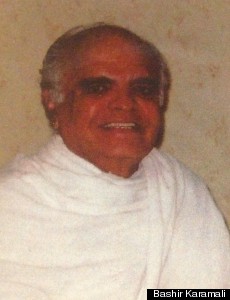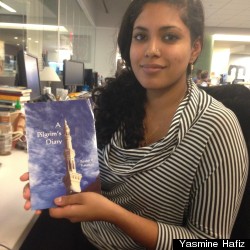The Hajj is almost complete, and pilgrims are taking the final steps of their spiritual journey to get closer to God. As this sacred time draws to a close, I am reminded of my grandfather Bashir Karamali's personal experience on this holy trip.

Wracked with a deep cough and suffering from "just a touch" of pneumonia, my grandfather returned from Hajj, the Islamic pilgrimage that practicing Muslims are required to undertake at least once in their lives. The intense experience had left him physically weakened, but completely rejuvenated in the spiritual sense upon his return from the 2006 Hajj.
I wished I had been beside him to support him between the hills of Safa and Marwa, the plains of Arafat, and inside the fervent crush of the Haram-e-Shareef. Though I didn't go on Hajj that year, I did accompany him in spirit, along with his other grandchildren and children through the reflective diary he kept of his spiritual marathon.
He wrote before the pilgrimage, "With the realization that the month of December was soon going to show up on the calendar, I began to feel a surge of spiritual awakening in my mind. Finally, the day would come when I would begin my journey to God's land -- the site of the Holy Kaabah, whose image is permanently enshrined in the minds of the estimated 1.5 billion Muslims dwelling all over the globe."
A dream of his for years, his Hajj plans fell into place when his brother Rafique and his wife Shaukat agreed to undertake the pilgrimage with him.
When he arrived in Mecca, he wrote of "the kind of electrifying sensation that runs through your body and mind when you behold the first place of worship built by Prophet Abraham to glorify the Creator of the Universe." The religious complex was packed with pilgrims from all four corners of the globe, all chanting the Talbiya verse in Arabic:
"Here I am at Your service O Lord, here I am.
Here I am. There is no partner to You.
Here I am.
Truly, the praise and favor is Yours, and the dominion.
There is no partner to You."
He said, "Whether one is on a bus or on a street, approaching a mosque or walking on the Plain of Arafat, you hear this constant refrain flowing from the lips of the pilgrims almost spontaneously. It marks an affirmation of a Muslim's total submission to Allah's commands and, like a National Anthem, reflects the grand unity of the Ummah (community of Muslim brothers and sisters) no matter from which corner of the world they hail."
My grandfather has always been a source of spiritual inspiration to me, particularly in terms of the loving interfaith marriage of over 50 years that he celebrates with my grandmother, Yvonne, a practicing Baptist. Due to the prohibition on non-Muslims entering the holy city of Mecca, she wasn't able to accompany him on this journey. But though their rituals to get in touch with God are different, they still believe in the same creator.

Hajj is a time to reflect on one's own spirituality as well as connect with the greater Muslim community. Equality is emphasized with modest dress and shared rituals. Even the genders come together in a way that they do not in many other spaces, as my grandfather noted, "Incidentally, the Haram Shareef is the only mosque that I have seen in the world that does not separate men and women while they perform their Namaaz (the five daily prayers)."
When he completed his pilgrimage, he joyously wrote, "The formal Hajj is finally over, as the trip to Medina is essentially a side-trip and not a part of the Hajj rituals. To sum up the Hajj experience, all I can say is that it creates a very powerful resurgence of one's spiritual being. No man remains the same after having gone through this process of fusion of spiritual values/faith (iman) and your heart. One learns to pay much less heed to worldly values. I too have changed - only time will tell to what extent!"
Bashir A. Karamali was born in Pune, India, in 1932 and migrated to Pakistan in 1947. He holds degrees in Economics from Sind University, Karachi University, and Yale University. He passed his Ph.D. (Comprehensives) from Yale University in 1959. He worked in the State Bank of Pakistan from 1952 to 1967 and in the International Monetary Fund (Washington, D.C.) from 1967 to 1988. He retired as Assistant Director of the Middle-Eastern Department in 1988. Bashir married his wife, Yvonne (from Sri Lanka, whom he met on the Yale campus where both were Fulbright Scholars) in 1961 and currently resides in Bellingham, Washington.